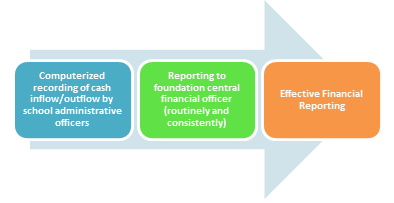The implementation of effective computerized financial reporting procedure at a school foundation in South Jakarta, Indonesia
DOI:
https://doi.org/10.22219/jcse.v4i1.24889Keywords:
Standard Operating Procedure, Financial Reporting, Computer, School, FoundationAbstract
Yayasan Pendidikan Daya Dutika Cenderawasih (YPDDC) is a school foundation in South Jakarta, Indonesia, that oversees six schools including two elementary schools, two junior high schools, and two senior high schools in three different areas, namely Cipete (South Jakarta), Cilandak (South Jakarta), and Pondok Aren (South Tangerang). YPDDC did not have an effective financial reporting. This caused financial managers at the YPDDC to experience difficulties in monitoring and evaluating the schools’ financial reports. The objective of this community service was to provide an assistance in computerized financial reporting, which was implemented by making Standard Operating Procedures (SOP) for computerized financial reporting in all YPDDC schools. The benefit of. The method applied in this community service program is assistance which carried out in several stages, including: 1) the interview and observation stage; 2) the implementation stage; 3) the socialization stage; 4) the implementation and evaluation stage. The result of this assistance was there is an improvement at skills of the administrative officers and central financial officer about how to do computerized financial reporting by following the SOP. The results of this assistance program was the creation of SOP for computerized financial reporting which was ready to be implemented.
Downloads
References
Agrawal, R., Majumdar, A., Majumdar, K., Raut, R. D., & Narkhede, B. E. (2022). Attaining sustainable development goals (SDGs) through supply chain practices and business strategies: A systematic review with bibliometric and network analyses. Business Strategy and the Environment, 31(7), 3669–3687. https://doi.org/10.1002/bse.3057
Aly, E., Elsawah, S., & Ryan, M. G. (2022). A review and catalogue to the use of models in enabling the achievement of sustainable development goals (SDG). Journal of Cleaner Production, 340. https://doi.org/10.1016/j.jclepro.2022.130803
Ameli, M., Esfandabadi, Z. S., Sadeghi, S., Ranjbari, M., & Zanetti, M. C. (2023). COVID-19 and SustainableDevelopmentGoals(SDGs): Scenario analysis through fuzzy cognitive map modeling. Gondwana Research, 114, 138–155. https://doi.org/10.1016/j.gr.2021.12.014
Biswan, A. T., Masudin, & Handaka, R. D. (2018). Memangnya TPQ tidak perlu SOP? PKN STAN Press, 275–292.
Bose, S., & Khan, H. Z. (2022). Sustainable Development Goals (SDGs) reporting, progress, and the role of country-level institutional factors: An international evidence. Journal of Cleaner Production, 335. https://doi.org/10.1016/j.jclepro.2021.130290
Chauhan, C., Kaur, P., Arrawatia, R., Ractham, P., & Dhir, A. (2022). Supply chain collaboration and sustainable development goals (SDGs). Teamwork makes achieving SDGs dream work. Journal of Business Research, 147, 290–307. https://doi.org/10.1016/j.jbusres.2022.03.044
Dewi, R. M., & Aminah, A. (2018). Pelatihan manajamen dan administrasi keuangan sekolah di tk ‘aisyiyah tangerang selatan. Seminar Hasil Pengabdian Kepada Masyarakat, 1, 177–179.
Fauzan. (2019). Pengembangan sistem informasi pengelolaan keuangan berbasis komputer di SMK Yafalah Ginggangtani. Joined Journal: Journal Information & Education, 2(2), 7–18. https://doi.org/10.31331/joined.v2i2.931
Indrasari, A., & Putra, W. M. (2020). Pendampingan sistem dan panduan RAPBS sekolah Muhammadiyah. Prosiding Semnas PPM 2020: Inovasi Teknologi Dan Pengembangan Teknologi Informasi Dalam Pemberdayaan Masyarakat Pasca Covid-19, 1208–1212.
Lauwo, S. G., Azure, J. D.-C., & Hopper, T. (2022). Accountability and governance in implementing the Sustainable Development Goals in a developing country context: Evidence from Tanzania. Accounting, Auditing & Accountability Journal, 35(6), 1431–1461.
Nazaruddin, I., & Putra, W. M. (2021). Peningkatan akuntabilitas penyelenggaraan keuangan sekolah. Webinar Abdimas 4 - 2021: Inovasi Teknologi Tepat Guna Dan Model Peningkatan Kapasitas Masyarakat Era Covid-19, 776–781.
Nugraha, S. A., & Setiawan, R. (2016). Perancangan sistem informasi pengolahan administrasi keuangan sekolah menengah pertama Islam terpadu. Jurnal STT-Garut, 13(1), 320–332. https://doi.org/10.33364/algoritma/v.13-2.320
Olabi, A. G., Obaideen, K., Elsaid, K., Wilberforce, T., Sayed, E. T., Maghrabie, H. M., & Abdelkareem, M. A. (2022). Assessment of the pre-combustion carbon capture contribution into sustainable development goals SDGs using novel indicators. Renewable and Sustainable Energy Reviews, 153. https://doi.org/10.1016/j.rser.2021.111710
Parmentola, A., Petrillo, A., Tutore, I., & De Felice, F. (2022). Is blockchain able to enhance environmental sustainability? A systematic review and research agenda from the perspective of Sustainable Development Goals (SDGs). Business Strategy and the Environment, 31, 94–217. https://doi.org/10.1002/bse.2882
Purnama, I. N., & Estiyanti, N. M. (2021). Pendampingan sistem pelaporan keuangan di SMK Werdhi Sila Kumara Badung Bali. Jurnal Pengabdian Masyarakat: Darma Bakti Teuku Umar, 2(1), 205–215.
Putra, W. M. (2021). Pendampingan penyusunan pedoman tata kelola anggaran keuangan SD SMP Muhammadiyah di Kota Yogyakarta. Prosiding Seminar Nasional Dan Call for Papers “Pengembangan Sumber Daya Perdesaan Dan Kearifan Lokal Berkelanjutan" IX, 376–384.
Rinawati. (2021). Education financial management during covid-19 pandemic of islamic universities in south kalimantan. Dinamika Ilmu, 21(2), 383–396. https://doi.org/10.21093/di.v21i2.3607
Shayan, N. F., Mohabbati-Kalejahi, N., Alavi, S., & Zahed, M. A. (2022). Sustainable Development Goals (SDGs) as a framework for Corporate Social Responsibility (CSR). Sustainability, 14. https://doi.org/10.3390/su14031222
Tetteh, L. A., Agyenim-Boateng, C., & Simpson, S. N. Y. (2022). Institutional pressures and strategic response to auditing implementation of sustainable development goals: The role of public sector auditors. Journal of Applied Accounting Research.
Venkatesh, V. (2000). Determinants of perceived ease of use: Integrating control, intrinsic motivation, and emotion into the technology acceptance model. Information Systems Research, 11(4), 342–365.
Venkatesh, V., Morris, M. G., Davis, G. B., & Davis, F. D. (2003). User acceptance of information technology: Toward a unified view. MIS Quarterly, 26(3), 425–478. https://doi.org/10.2307/30036540
Voola, R., Bandyopadhyay, C., Voola, A., Ray, S., & Carlson, J. (2022). B2B marketing scholarship and the UN sustainable development goals (SDGs): A systematic literature review. Industrial Marketing Management, 101, 12–32. https://doi.org/10.1016/j.indmarman.2021.11.013
Zahra, H. A., Febrian, E., & Amar, S. C. D. (2019). Faktor-faktor yang mempengaruhi sikap dan intensi pengurus koperasi untuk menggunakan platform layanan keuangan digital di Kota Bandung. Jurnal Manajemen, 10(2), 155–165.
Zakari, A., Khan, I., Tan, D., Alvarado, R., & Dagar, V. (2022). Energy efficiency and sustainable development goals (SDGs). Energy, 239(Part E). https://doi.org/10.1016/j.energy.2021.122365

Downloads
Published
How to Cite
Issue
Section
License
Copyright (c) 2023 Sakina Nusarifa Tantri, Fitriyah Nurhidayah

This work is licensed under a Creative Commons Attribution-ShareAlike 4.0 International License.












